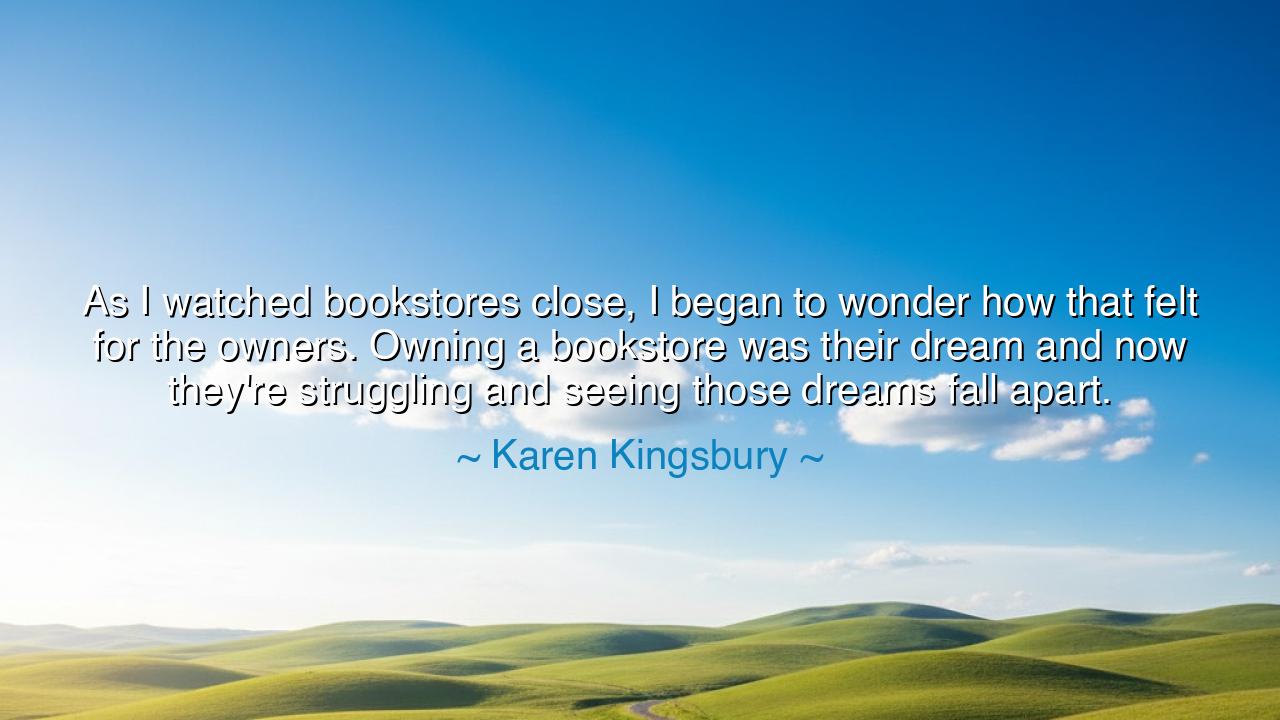
As I watched bookstores close, I began to wonder how that felt
As I watched bookstores close, I began to wonder how that felt for the owners. Owning a bookstore was their dream and now they're struggling and seeing those dreams fall apart.






When Karen Kingsbury wrote, “As I watched bookstores close, I began to wonder how that felt for the owners. Owning a bookstore was their dream and now they're struggling and seeing those dreams fall apart,” she was speaking not only as an author, but as a guardian of the human spirit — one who understands that dreams are living things, fragile yet divine. In this reflection lies a quiet sorrow, but also a profound reverence: the recognition that behind every closing door, every flickering light of a dying bookstore, there once lived a heart that dared to dream. Her words are not merely about commerce or industry — they are about the sanctity of hope, the tragedy of its loss, and the beauty of those who dare to keep dreaming despite the storms of change.
The origin of this quote arises from a time of transformation, when the world of printed books began to tremble beneath the weight of the digital age. Bookstores — once temples of thought, where ideas met readers in the soft rustle of pages — began to vanish from city streets. Chains fell first, then independents; and in their place rose the cold brilliance of screens. Kingsbury, whose life has been shaped by words and stories, saw not merely a shift in technology, but a wound in the soul of human culture. For she understood that each bookstore was not just a business, but a dream embodied — a sanctuary of imagination, a meeting place for hearts seeking meaning.
The image of bookstore owners watching their dreams fall apart is both personal and universal. For what is a bookstore but a labor of love? Those who open one do not do so for wealth, but for purpose — to share knowledge, to nourish minds, to bring beauty into the world. Their shelves are filled not with inventory, but with belief — in literature, in learning, in the human hunger for truth. To see such a dream collapse is to witness the quiet death of a piece of the human spirit. Kingsbury’s empathy in this moment is not that of an observer, but of a fellow dreamer who knows that no soul escapes the risk of disappointment when it dares to hope greatly.
The ancients, too, spoke of such heartbreak — for it is the natural shadow of vision. Consider the story of Daedalus, the craftsman who built wings for himself and his son Icarus, hoping to soar into freedom. His invention was a triumph of imagination, yet it ended in tragedy. Still, Daedalus’s dream — though scarred by loss — changed humanity’s understanding of what was possible. So too, every dreamer who fails has already succeeded in enriching the world, for to dream is to lift the soul toward eternity. The closing of a bookstore, then, is not the death of its dream, but its transformation — for its essence lives on in every reader it once inspired.
Kingsbury’s lament also carries a deeper message about change and resilience. Every age brings new challenges that test the endurance of human creativity. The scribes of ancient Alexandria saw their scrolls consumed by flame; yet centuries later, the words they preserved live on in other forms. Likewise, though bookstores may fade, the love of stories remains eternal. The dream must adapt, not die. The wise understand that when one vessel breaks, the spirit must flow into another. Thus, the dream of the bookstore may live on in libraries, in small presses, in community gatherings, or even in the glowing screens of readers who still yearn to feel.
There is also, within Kingsbury’s reflection, a gentle rebuke — not to the dreamers, but to the world that forgets them. We live in an age of convenience, where the slow wonder of discovery is too often sacrificed for speed. Yet each time a bookstore closes, the world grows quieter, less curious, less human. To support such dreams is to defend our shared humanity. For these places are more than shops — they are the hearths of culture, where ideas are kindled and hearts are warmed. When we let them vanish, we lose a piece of ourselves.
And so, the lesson is clear: cherish the dreamers, and guard the sanctuaries they build. Visit the bookstore. Speak to the owner. Buy a book not just with money, but with gratitude — for you are not purchasing paper and ink, but keeping alive the sacred fire of imagination. And if your own dream falters, remember the ones who came before you: those who dared, who built, who loved, even when the world changed around them. As Kingsbury teaches through her compassion, the death of a dream need not be its end — for what is dreamed in truth will always find another form. The walls may crumble, but the dream itself endures, whispering to every generation: “Dare again. Build again. Believe again.”






AAdministratorAdministrator
Welcome, honored guests. Please leave a comment, we will respond soon